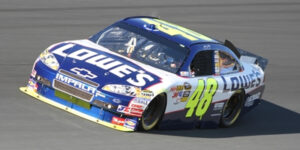After a wonderful Thanksgiving weekend and more food that I should have even attempted to consume, it was finally time to reflect on the 2010 NASCAR Sprint Cup season. Although the result at the end was the same as it has been for the last five years, I keep hearing the new rallying cry for those who tend to cheerlead for the sanctioning body. That statement is that the 2010 season was the most competitive in the history of NASCAR. Please. It’s not even close and for a number of reasons.
[media-credit name=”Brad Keppel” align=”alignleft” width=”300″] [/media-credit]The 2010 championship race was close, but just like a closer 2004 championship in which Kurt Busch beat out Jimmie Johnson by eight points, it was artificially contrived. Listening to those cheerleaders, you’d think that racing in the past were always runaways with the winner being ahead by a lap and the rest of the field just driving around. Today we have the “Lucky Dog” which allows a driver to make up a lap without racing for it. Done in the name of safety, it allows the more affluent teams to make up laps when they make an unfortunate mistake. I can remember the race at Richmond International Raceway in 1970 when Richard Petty made up multiple laps by racing for them. James Hylton won the race, but Petty wasn’t given any consideration, like today.
[/media-credit]The 2010 championship race was close, but just like a closer 2004 championship in which Kurt Busch beat out Jimmie Johnson by eight points, it was artificially contrived. Listening to those cheerleaders, you’d think that racing in the past were always runaways with the winner being ahead by a lap and the rest of the field just driving around. Today we have the “Lucky Dog” which allows a driver to make up a lap without racing for it. Done in the name of safety, it allows the more affluent teams to make up laps when they make an unfortunate mistake. I can remember the race at Richmond International Raceway in 1970 when Richard Petty made up multiple laps by racing for them. James Hylton won the race, but Petty wasn’t given any consideration, like today.
Then there’s the wave around. Fans love this system whereby if the cars are on the end of the lead lap they are waved around to the end of the lead lap and don’t have to race to keep their position on the lead lap. The double-file restart artificially makes racing closer allowing a car in the tenth position to only be only four cars from the lead. There are advantages today.
In 1970, when you really had to earn your position on the track by racing, there were 10 winners, among three manufacturers. In 47 races, 21 Plymouths, 14 Dodges, and 12 Fords won that year. In 1980, Dale Earnhardt won the championship by 18 points. In 2010, Jimmie Johnson won the championship by 39 points. During the season, 12 drivers won, but most were in Chevrolets (18). Toyota won 12 races, Ford won four races, and Dodge won two. The four dominant teams of Hendrick Motorsports, Richard Childress Racing, Joe Gibbs Racing, and Roush-Fenway Racing won 28 of the 36 races (and I’m counting the Stewart-Haas wins in this total). And they won those with a contrived system.
So I contend that 2010 wasn’t the most competitive season in NASCAR history. Far from it. NASCAR, in their quest to make folks more interested, have created the Chase, the Lucky Dog, the wave around, and the double file restart and then have proclaimed how much better they are. Sorry, but it just doesn’t play well with those of us who have lived long enough to remember the past.
It’s a good marketing slogan, and lord knows the series needs it, but it’s nowhere accurate. The year 2010 was good, but claiming it the best in history is a little much. Any sport that claims the most competitive season must explain why the same guy wins every year. Of course, that the fallacy of placing so much emphasis on the championship, but as we have seen, it has a lot more to do with competition in the races than the championship anyway. Let’s hope 2011 sees the parity among teams that we should see and have seen in the distant past.










Nascar is really fooling themselves. How bad is it going to get for them? Stay tuned.